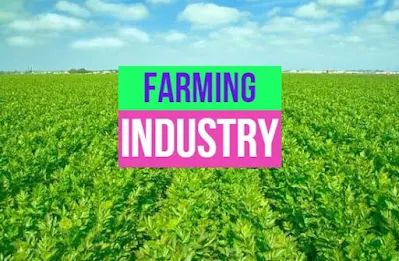The farming industry is the sector of agriculture that involves the cultivation of crops or the raising of livestock for food, fuel, or other products. It includes a range of activities from growing crops and raising animals, to processing and selling agricultural products. The farming industry is an essential component of the global food supply and plays a critical role in meeting the growing demand for food as the world population continues to grow.
Farming can be performed on a small scale, such as a family garden, or a large scale such as an agriculture business. Modern farming practices often involve the use of advanced technologies, such as precision agriculture and genetically modified crops, to improve efficiency, yield, and profitability. In addition, farmers may also use sustainable farming practices to protect the environment and conserve resources.
$ads={1}Another trend in the farming industry is the increasing demand for organic and locally sourced food. Consumers are becoming more interested in the origins of their food and are looking for products that are produced using sustainable and environmentally friendly methods. In response, many farmers are turning to organic farming and direct-to-consumer marketing, such as community-supported agriculture, to meet this demand and improve their competitiveness in the marketplace.
The farming industry also has an impact on the global food system, from the production of raw materials to the distribution and sale of finished products. In many countries, the industry is highly regulated, with policies in place to ensure food safety, promote fair trade, and protect the environment.
The farming industry also contributes to the global economy, as agricultural products are traded globally, generating billions of dollars in revenue. The farming industry is also a part of the agriculture industry. In many developing countries, agriculture is the backbone of the economy, providing livelihoods for millions of people.
The farming industry is also an important source of innovation, with new technologies and practices being developed all the time to improve efficiency, yield, and sustainability. For example, advances in genetic engineering have led to the development of crops that are resistant to pests and diseases, reducing the need for harmful pesticides and herbicides.
In addition to traditional crops and livestock, the farming industry also encompasses other forms of agriculture, such as aquaculture (the cultivation of fish and other aquatic species), forestry (the management of forested lands), and horticulture (the cultivation of fruits, vegetables, and ornamental plants). These diverse forms of agriculture contribute to the diversity of the global food system and help to meet the growing demand for food, fuel, and other resources.
Farming Industry Challenges
Farming is a challenging industry, as it is subject to many variables, such as weather, disease, and market conditions. Farmers must carefully manage their resources, including land, water, and labor, to be successful. The farming industry also plays a significant role in rural communities, providing agricultural jobs and supporting local economies.
Despite its importance, the farming industry faces many challenges, such as declining profits, increased competition, and changing consumer demands. In response, many farmers are turning to alternative forms of agriculture, such as organic farming, to meet these challenges and secure their future in the industry.
One of the major challenges facing the farming industry is climate change. Extreme weather conditions, such as droughts and floods, can have a significant impact on crop yields and livestock health. In addition, rising temperatures and changing weather patterns can increase the prevalence of pests and diseases, which can further reduce crop yields and profitability. To address these challenges, farmers are turning to climate-smart agriculture, which involves using techniques such as crop rotation, water management, and agroforestry to mitigate the effects of climate change.
Another challenge facing the farming industry is the need for greater efficiency and productivity. With the global population projected to reach 9.7 billion by 2050, farmers will need to produce more food to meet growing demand. To achieve this goal, many farmers are turning to precision agriculture, which involves using technology, such as drones and sensors, to optimize crop management and improve yields.
Finally, the farming industry is also facing a labor shortage, as many workers are leaving the sector for other jobs. This is a significant challenge, as labor is a critical factor in the success of any farming business. To address this issue, many farmers are investing in new technologies, such as automation, to improve efficiency and reduce the need for labor.
In conclusion, the farming industry is facing many challenges and opportunities in the years ahead. Farmers must adapt to these changes to remain competitive and ensure their future in the industry. The farming industry is essential to the world's food security and economic stability. It is a complex and dynamic sector that is constantly evolving to meet the demands of a changing world.

